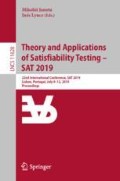Abstract
For quantified Boolean formulas (QBF) there are two main different approaches to solving: conflict-driven clause learning (QCDCL) and expansion solving. In this paper we compare the underlying proof systems and show that expansion systems admit strictly shorter proofs than QCDCL systems for formulas of bounded quantifier complexity, thus pointing towards potential advantages of expansion solving techniques over QCDCL solving.
Our first result shows that tree-like expansion systems allow short proofs of QBFs that are a source of hardness for QCDCL, i.e. tree-like \(\forall \textsf {Exp{+}Res}\) is strictly stronger than tree-like Q-Resolution.
In our second result we efficiently transform dag-like Q-Resolution proofs of QBFs with bounded quantifier complexity into \(\forall \textsf {Exp{+}Res}\) proofs. This is theoretical confirmation of experimental findings by Lonsing and Egly, who observed that expansion QBF solvers often outperform QCDCL solvers on instances with few quantifier alternations.
Access this chapter
Tax calculation will be finalised at checkout
Purchases are for personal use only
References
Balabanov, V., Jiang, J.H.R.: Unified QBF certification and its applications. Formal Methods Syst. Des. 41(1), 45–65 (2012)
Benedetti, M., Mangassarian, H.: QBF-based formal verification: experience and perspectives. J. Satisfiability Boolean Model. Comput. (JSAT) 5(1–4), 133–191 (2008)
Beyersdorff, O., Bonacina, I., Chew, L.: Lower bounds: from circuits to QBF proof systems. In: Proceedings of the ACM Conference on Innovations in Theoretical Computer Science (ITCS 2016), pp. 249–260. ACM (2016)
Beyersdorff, O., Chew, L., Janota, M.: Proof complexity of resolution-based QBF calculi. In: Proceedings of the Symposium on Theoretical Aspects of Computer Science, pp. 76–89. LIPIcs Series (2015)
Beyersdorff, O., Chew, L., Mahajan, M., Shukla, A.: Are short proofs narrow? QBF resolution is not so simple. ACM Trans. Comput. Logic 19(1), 1:1–1:26 (2018). (preliminary version in STACS 2016)
Beyersdorff, O., Chew, L., Mahajan, M., Shukla, A.: Understanding cutting planes for QBFs. Inf. Comput. 262, 141–161 (2018)
Beyersdorff, O., Galesi, N., Lauria, M.: A characterization of tree-like resolution size. Inf. Process. Lett. 113(18), 666–671 (2013)
Beyersdorff, O., Pich, J.: Understanding Gentzen and Frege systems for QBF. In: Proceedings of the ACM/IEEE Symposium on Logic in Computer Science (LICS 2016) (2016)
Blinkhorn, J., Beyersdorff, O.: Shortening QBF proofs with dependency schemes. In: Gaspers, S., Walsh, T. (eds.) SAT 2017. LNCS, vol. 10491, pp. 263–280. Springer, Cham (2017). https://doi.org/10.1007/978-3-319-66263-3_17
Buss, S.R.: Towards NP-P via proof complexity and search. Ann. Pure Appl. Logic 163(7), 906–917 (2012)
Cook, S.A., Reckhow, R.A.: The relative efficiency of propositional proof systems. J. Symb. Logic 44(1), 36–50 (1979)
Egly, U., Kronegger, M., Lonsing, F., Pfandler, A.: Conformant planning as a case study of incremental QBF solving. Ann. Math. Artif. Intell. 80(1), 21–45 (2017)
Egly, U., Lonsing, F., Widl, M.: Long-distance resolution: proof generation and strategy extraction in search-based QBF solving. In: McMillan, K., Middeldorp, A., Voronkov, A. (eds.) LPAR 2013. LNCS, vol. 8312, pp. 291–308. Springer, Heidelberg (2013). https://doi.org/10.1007/978-3-642-45221-5_21
Janota, M., Klieber, W., Marques-Silva, J., Clarke, E.: Solving QBF with counterexample guided refinement. In: Cimatti, A., Sebastiani, R. (eds.) SAT 2012. LNCS, vol. 7317, pp. 114–128. Springer, Heidelberg (2012). https://doi.org/10.1007/978-3-642-31612-8_10
Janota, M., Marques-Silva, J.: Expansion-based QBF solving versus Q-resolution. Theor. Comput. Sci. 577, 25–42 (2015)
Kleine Büning, H., Bubeck, U.: Theory of quantified Boolean formulas. In: Biere, A., Heule, M., van Maaren, H., Walsh, T. (eds.) Handbook of Satisfiability, Frontiers in Artificial Intelligence and Applications, vol. 185, pp. 735–760. IOS Press (2009)
Kleine Büning, H., Karpinski, M., Flögel, A.: Resolution for quantified Boolean formulas. Inf. Comput. 117(1), 12–18 (1995)
Klieber, W., Sapra, S., Gao, S., Clarke, E.: A non-prenex, non-clausal QBF solver with game-state learning. In: Strichman, O., Szeider, S. (eds.) SAT 2010. LNCS, vol. 6175, pp. 128–142. Springer, Heidelberg (2010). https://doi.org/10.1007/978-3-642-14186-7_12
Kontchakov, R., et al.: Minimal module extraction from DL-lite ontologies using QBF solvers. In: Proceedings of the International Joint Conference on Artificial Intelligence (IJCAI), pp. 836–841. AAAI Press (2009)
Lonsing, F.: Dependency schemes and search-based QBF solving: theory and practice. Ph.D. thesis, Johannes Kepler University (2012)
Lonsing, F., Biere, A.: DepQBF: a dependency-aware QBF solver. JSAT 7(2–3), 71–76 (2010)
Lonsing, F., Egly, U.: Evaluating QBF solvers: quantifier alternations matter. In: Hooker, J. (ed.) CP 2018. LNCS, vol. 11008, pp. 276–294. Springer, Cham (2018). https://doi.org/10.1007/978-3-319-98334-9_19
Nordström, J.: On the interplay between proof complexity and SAT solving. SIGLOG News 2(3), 19–44 (2015)
Rabe, M.N., Tentrup, L.: CAQE: a certifying QBF solver. In: Proceedings of the 15th Conference on Formal Methods in Computer-Aided Design, pp. 136–143. FMCAD Inc. (2015)
Vardi, M.Y.: Boolean satisfiability: theory and engineering. Commun. ACM 57(3), 5 (2014)
Zhang, L., Malik, S.: Conflict driven learning in a quantified Boolean satisfiability solver. In: ICCAD, pp. 442–449 (2002)
Acknowledgements
Some of this work was done at Dagstuhl Seminar 18051, Proof Complexity. Research supported by the John Templeton Foundation and the Carl Zeiss Foundation (1st author) and EPSRC (2nd author).
Author information
Authors and Affiliations
Corresponding author
Editor information
Editors and Affiliations
Rights and permissions
Copyright information
© 2019 Springer Nature Switzerland AG
About this paper
Cite this paper
Beyersdorff, O., Chew, L., Clymo, J., Mahajan, M. (2019). Short Proofs in QBF Expansion. In: Janota, M., Lynce, I. (eds) Theory and Applications of Satisfiability Testing – SAT 2019. SAT 2019. Lecture Notes in Computer Science(), vol 11628. Springer, Cham. https://doi.org/10.1007/978-3-030-24258-9_2
Download citation
DOI: https://doi.org/10.1007/978-3-030-24258-9_2
Published:
Publisher Name: Springer, Cham
Print ISBN: 978-3-030-24257-2
Online ISBN: 978-3-030-24258-9
eBook Packages: Computer ScienceComputer Science (R0)

